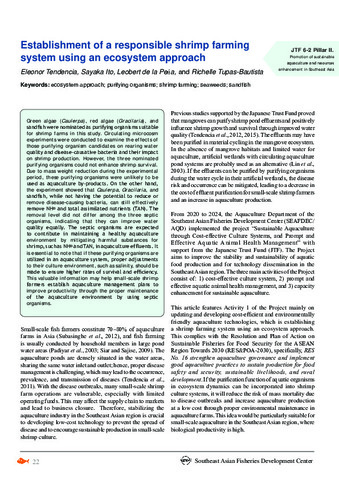Establishment of a responsible shrimp farming system using an ecosystem approach
- Global styles
- MLA
- Vancouver
- Elsevier - Harvard
- APA
- Help
Share
Abstract
Green algae (Caulerpa), red algae (Gracilaria), and sandfish were nominated as purifying organisms suitable for shrimp farms in this study. Circulating microcosm experiments were conducted to examine the effects of those purifying organism candidates on rearing water quality and disease-causative bacteria and their impact on shrimp production. However, the three nominated purifying organisms could not enhance shrimp survival. Due to mass weight reduction during the experimental period, these purifying organisms were unlikely to be used as aquaculture by-products. On the other hand, the experiment showed that Caulerpa, Gracilaria, and sandfish, while not having the potential to reduce or remove disease-causing bacteria, can still effectively remove NH₄ and total assimilated nutrients (TAN). The removal level did not differ among the three septic organisms, indicating that they can improve water quality equally. The septic organisms are expected to contribute in maintaining a healthy aquaculture environment by mitigating harmful substances for shrimp, such as NH₄ and TAN, in aquaculture effluents. It is essential to note that if these purifying organisms are utilized in an aquaculture system, proper adjustments to their culture environment, such as salinity, should be made to ensure higher rates of survival and efficiency. This valuable information may help small-scale shrimp farmers establish aquaculture management plans to improve productivity through the proper maintenance of the aquaculture environment by using septic organisms.
Suggested Citation
Tendencia, E., Ito, S., Peńa, L. d. l., & Tupas-Bautista, R. (2024). Establishment of a responsible shrimp farming system using an ecosystem approach. Fish for the People , 22(3), 22-25. http://hdl.handle.net/20.500.12066/7576
Type
magazineArticleCollections
- Fish for the People [41]



